Boardwatch Chicago: The March 28 Board of Education Meeting
The Chicago Board of Education started its March 28, 2007 meeting by recognizing three CPS teachers who were Golden Apple winners. All were from high schools, and two were from the “college prep” high schools (Lindblom, Payton). The next meeting at 125 S. Clark on April 25 is at 10:30 a.m. Speakers must sign up between 8 and 9 a.m. and will be given a maximum of 2 minutes on the floor.The third was from Curie, which had been in the news lately. Principal Jerilyn Jones — wronged by a local school council that voted not to retain her — said that this was the third Golden Apple winner for the Curie faculty. That must be a record for the city, and possibly overall (although the University of Chicago Lab school has had quite a few Golden Apples, too).
After the Apples, the Board spent more than five minutes lauding Hosanna Mahaley Johnson, who is taking a position in Atlanta. Johnson had begun her career as an aide to Mayor Richard M. Daley at City Hall, and was promoted to Chief of Staff at CPS in 2002. Mostly recently, she has been in charge of Renaissance 2010 and the closing of public schools as “Chief, New Schools.”
Students with high-test scores were also recognized.
After nearly an hour, the “Public Participation” part of the monthly meeting started at 11:20 a.m.
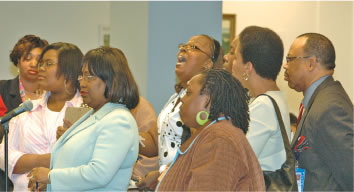 Lawrence Elementary problem leads to confrontation, later arrest. As security approaches (far right in photo above), Charlene Moore (head raised), one of a dozen parents from Lawrence Elementary School (9928 S. Crandon) challenges the characterization by Board of Education executive Jacqueline Anderson (at microphone) during the Board’s discussion of the situation at Lawrence. Anderson was called on by Board President Rufus Williams and immediately told the Board that the problems at Lawrence resulted from insubordinate behavior by students, parents, teachers, and other staff — who should be following the orders of the school’s new principal. At the time, the Board had forgotten that Ms. Moore had spoken about the security crisis at the school (including a dramatic injury to her son when he attempted to protect a teacher who was being attacked) at the January Board meeting. Although the parents had been at the Board as early as 7:00 a.m. in order to sign up to speak during the 8:00 a.m. to 9:00 a.m. sign up time, when they returned to the school later in the day, Moore was arrested by Chicago Police. According to Moore, the school’s principal claimed that she had put a gun to her head and threatened to kill her earlier in the day in the school’s main office. (Substance photo by George N. Schmidt).A number of speakers were to warn the Board against using the recent Curie High School flap to cut back on the powers of local school councils. The first speaker was Wanda Taylor of Price School. She said she is Cluster 5 NCLB Chair and asked the Board to not limit the role of LSCs because of the machinations of one LSC, the Curie LSC. Many suspect some hidden agenda. In defense of the Curie LSC, Taylor had a long, long analogy comparing the Chicago Bulls transition to its winningest seasons (under Phil Jackson) and the recent Curie controversies.
Lawrence Elementary problem leads to confrontation, later arrest. As security approaches (far right in photo above), Charlene Moore (head raised), one of a dozen parents from Lawrence Elementary School (9928 S. Crandon) challenges the characterization by Board of Education executive Jacqueline Anderson (at microphone) during the Board’s discussion of the situation at Lawrence. Anderson was called on by Board President Rufus Williams and immediately told the Board that the problems at Lawrence resulted from insubordinate behavior by students, parents, teachers, and other staff — who should be following the orders of the school’s new principal. At the time, the Board had forgotten that Ms. Moore had spoken about the security crisis at the school (including a dramatic injury to her son when he attempted to protect a teacher who was being attacked) at the January Board meeting. Although the parents had been at the Board as early as 7:00 a.m. in order to sign up to speak during the 8:00 a.m. to 9:00 a.m. sign up time, when they returned to the school later in the day, Moore was arrested by Chicago Police. According to Moore, the school’s principal claimed that she had put a gun to her head and threatened to kill her earlier in the day in the school’s main office. (Substance photo by George N. Schmidt).A number of speakers were to warn the Board against using the recent Curie High School flap to cut back on the powers of local school councils. The first speaker was Wanda Taylor of Price School. She said she is Cluster 5 NCLB Chair and asked the Board to not limit the role of LSCs because of the machinations of one LSC, the Curie LSC. Many suspect some hidden agenda. In defense of the Curie LSC, Taylor had a long, long analogy comparing the Chicago Bulls transition to its winningest seasons (under Phil Jackson) and the recent Curie controversies.
Next Alfred Rodgers of Latino Organizations asked about new schools. “On the Southwest Side, When, When, I ask you,” Rodgers said, kidding the Board members. He said he wanted written answers.
After a bit of charm, Rodgers launched what should have been a bombshell. He said Gage Park High School had lost 300 students since September, thereby reducing the number of students in the building to the number that the fired principal had wanted to cap it at. Rodgers serves on the Gage Park LSC and had supported principal Martin McGreal, who was fired by Arne Duncan after refusing to allow Duncan to force overcrowding on the school. [McGreal is presently teaching English at nearby Curie High School, and reportedly happy in his teaching job...].
“Where are they now?” Rodgers asked. He also asked about security guards. There has been a steady increase of violence and problems since Duncan removed the chosen Principal and appointed one.
The next speaker was Larry Minter, who said he had been working as a volunteer coaching for Bogan High School. He stated that there should be an investigation of security, since, he claimed, female students said they had been “violated” near washrooms. He said some schools had students with no books and that these students were being set up to fail. Andres Durbak, chief of school security for CPS, was asked to investigate the allegations.
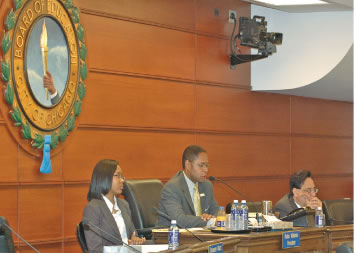 Board President continues to provoke speakers. At several points during the March 28 meeting, Board President Rufus Williams (above, center) responded with hostility to comments from parents and the public. At the March 28 meeting, the Board deliberately packed most of the seats in the Board chambers with its own executive staff and with “social worker interns” so that most of the public was forced to watch the proceedings on closed circuit TV twelve floors away. The Lawrence Elementary School controversy had caused concern to some Board officials because it was being widely reported and followed on a blog (District 299.com) that is read by many people around the country for information regarding CPS. By April 6, the blog had 92 pages of postings about the Lawrence crisis. (Substance photo by George N. Schmidt).Dwayne Truss, of the Austin High School TAC (Transition Advisory Council) asked why there were only two schools in the reopening Austin — instead of the three promised. He said students from the Austin area were still being sent away to other places. He asked for the former attendance boundaries to be restored to Austin and that LSC powers not be limited.
Board President continues to provoke speakers. At several points during the March 28 meeting, Board President Rufus Williams (above, center) responded with hostility to comments from parents and the public. At the March 28 meeting, the Board deliberately packed most of the seats in the Board chambers with its own executive staff and with “social worker interns” so that most of the public was forced to watch the proceedings on closed circuit TV twelve floors away. The Lawrence Elementary School controversy had caused concern to some Board officials because it was being widely reported and followed on a blog (District 299.com) that is read by many people around the country for information regarding CPS. By April 6, the blog had 92 pages of postings about the Lawrence crisis. (Substance photo by George N. Schmidt).Dwayne Truss, of the Austin High School TAC (Transition Advisory Council) asked why there were only two schools in the reopening Austin — instead of the three promised. He said students from the Austin area were still being sent away to other places. He asked for the former attendance boundaries to be restored to Austin and that LSC powers not be limited.
Allison Slade of Namaste Charter School (the founder of the charter), talked about the need to improve services to special needs students at the school (and at other charters). She said she had successful relations with the proper departments, but some matters are of urgent need of special services for special needs. Unstated was the fact that the charter schools have been cited for several years for under serving children with special needs. This has increased as a problem since CPS cuts $26.5 million from the special education budget last June.
Neal Resnikoff from Senn High School’s “Save Senn” coalition continued to critique the Board’s military policies. He spoke of the CPS Board and administration’s favoritism for the Rickover Naval Academy forcibly pushed into Senn’s building. It has been going on for two years, he said, discriminating against the education of regular Senn students so that they are not receiving the same, but an inferior education.
“Right now the academy has 15.4 students per classroom,” Resnikoff said, “while Senn High School has 18.3 students per classroom.” He cited other figures. One of the most challenging was based on a community examination of the Board’s claims that there is a “waiting list” for the naval academy. Resnikoff noted that by this year, in its second year of operation, Rickover was supposed to have 250 students (half way to its maximum of 500 under the Board’s “small schools” guidelines). Yet presently, Rickover has only 204 students.
So with only 204 students, the Naval Academy is taking up more and more space away from the 1,500 + students in the regular Senn.
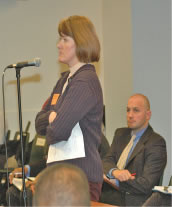 Despite the fact that the Board has a comprehensive “wellness” policy that is supposed to encourage physical activities at all grade levels, parent Amy Lux (above at micro- phone) returned to remind the Board that recess is still not being honored at the school her children attend and at many other Chicago elementary schools. (Substance photo by George N. Schmidt).“Right now...some art and other classes at Senn High School have as many as 40 students per class,” Resnikoff said. While there are two teachers in each classroom for Senn teachers, Naval Academy teachers have 1 and 1/2 classrooms per teacher. The Naval Academy has taken over the west wing of the building including all the science labs, which have been updated. Resnikoff said that Senn High School has a rolling cart that goes from class to class for certain activities, while in Rickover those activities are in the classrooms.
Despite the fact that the Board has a comprehensive “wellness” policy that is supposed to encourage physical activities at all grade levels, parent Amy Lux (above at micro- phone) returned to remind the Board that recess is still not being honored at the school her children attend and at many other Chicago elementary schools. (Substance photo by George N. Schmidt).“Right now...some art and other classes at Senn High School have as many as 40 students per class,” Resnikoff said. While there are two teachers in each classroom for Senn teachers, Naval Academy teachers have 1 and 1/2 classrooms per teacher. The Naval Academy has taken over the west wing of the building including all the science labs, which have been updated. Resnikoff said that Senn High School has a rolling cart that goes from class to class for certain activities, while in Rickover those activities are in the classrooms.
In addition, Senn had two librarians for about 1,500 students, but CPS took one away and assigned one for the 1,500 (Senn students) and one only to work with the 204 students at the academy. Senn had two gyms. It now has only one for 1,500 Senn students and one for the 204. Resnikoff asked “What do you intend to do to eliminate the injustice and inequality (of education) between the military academy and Senn H. S.?” Board President Rufus Williams has been on the Board for the two years. However, he answered in a way that made many stop in their tracks: “I don’t believe there’s any injustice between the military academy and Senn High School,” Williams said. “I would question the source of the information.... I don’t think the military academy diminishes what goes on in Senn High School.”
Resnikoff stated the figures are Board figures announced at various public meetings, including faculty meetings. He asked when Williams would look at the figures. Williams said he already knew the figures and continued to publicly challenge Resnikoff.
Williams said, finally, “We’re doing the best we can by Senn High School...” to which Resnikoff replied, “It’s not good enough.” Williams said he’d look into it.
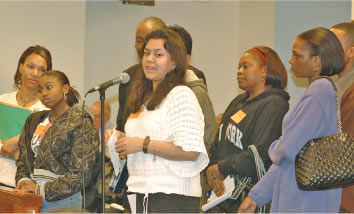 Curie High School remains before the Board. Curie High School student Danielle Martinez (above) brought the Board back to the question of the highly publicized vote of the Curie Local School Council not to renew the contract of popular principal Jerilynn Jones (below right). In sharp contrast to his hostile comments to representatives from Senn High School, Lawrence Elementary School, and others who were critical of the Board, Board President Rufus Williams devoted a good deal of time showing concern for the students from Curie. (Substance photo by George N. Schmidt).The Senn groups have had a speaker at every meeting and the discrimination in educational facilities and materials has been reported every month. Williams and the administration should have seen the inequities months ago
Curie High School remains before the Board. Curie High School student Danielle Martinez (above) brought the Board back to the question of the highly publicized vote of the Curie Local School Council not to renew the contract of popular principal Jerilynn Jones (below right). In sharp contrast to his hostile comments to representatives from Senn High School, Lawrence Elementary School, and others who were critical of the Board, Board President Rufus Williams devoted a good deal of time showing concern for the students from Curie. (Substance photo by George N. Schmidt).The Senn groups have had a speaker at every meeting and the discrimination in educational facilities and materials has been reported every month. Williams and the administration should have seen the inequities months ago
Next Burt Murrell asked that the Board not limit LSC authority because of one bad LSC at Curie. He mentioned arbitration for the principal (no principal has one an arbitration). He mentioned that the rulebooks printed at taxpayer expense have not been distributed.
Carol Winn a parent from CVS thanked God, James Deanes and Donald Pittman for their help. Then Winn continued her complaint. She said that Ms Nantwi (in the AIO office) had e-mailed instructions to the CVS administration, which has ignored it. She talked of injustice done to her years ago, how she feared for the same treatment of her daughter, who was trying to re-enroll. She had a meeting set up for her by Deanes and Pittman.
Amy Lux of the Coalition for Children’s Health continued to speak about the need for healthy practices for Chicago school children. This month, she spoke again about how all children need recess. She cited research of the benefits of breaks and intervals needed for good memory and mind. She advocated for recess for all young children. She said hyperactive children benefited most. She said recess is lost when the deprivation of recess is used as a punishment at the school her child is at. She said that the whole class misses recess if one child misbehaves. Rufus Williams said that he is trying to find ways to put recess in all schools. Lux said that her child is at Sutherland Elementary.
Janice Jeffries of the Marquette Elementary LSC, asked for effective parental rights protection. She was told if she had further problems with the Marquette administration, she was to call James Deanes. She talked about a number of problems She said that on the day when CPS did not have bus service (see 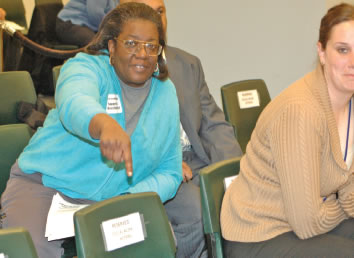 (Above) Packing the seats with administrators and “guests” keeps the public out of Board of Education meetings. Despite the fact that more than 250 people wanted to attend the March 28, 2007, meeting of the Chicago Board of Education, most were barred from the Board’s 5th floor meeting room and forced to spend the morning in “holding rooms” on the 19th floor. How? The Board reserves most of the seats in the room (especially those behind the speakers’ microphone where people will be seen on TV) for highly paid administrators and “guests.” Substance estimates that the administrators who spend the day every Board meeting taking up seats in the Board chambers have a total annual salary cost of more than $8 million. For more than ten years, it’s been possible to tell whether the Board is worried about the public participation session by noting the large number of young white women who fill seats directly in camera range. For reasons that have never been explained, the Board invites “social worker interns” to fill seats when it runs out of expensive administrators and political patronage appointees. Above: PURE’s Wanda Hopkins points to one of the seats reserved for the “social worker interns” before the beginning of the March 28 Board meeting. At the time Hopkins noted this, more than 150 people had been shuttled to the 19th floor “holding room” to keep them from the Board chambers. The social worker intern (right) did not identify herself. (Substance photo by George N. Schmidt). related article in this Substance) at all or improper bus service because of no heat in buses w without telling parents, her child who’s 8 year old was waiting for his mother outside because of the irregular bus service and, in front of him, the principal and an assistant principal threatened to call the police on her (the mother) for being late picking up the child. There were also had problems when LSC members asked questions about programs and communication. She said she wanted whistle blower protection from the administration. Williams said he’d look into the issues at Marquette.
(Above) Packing the seats with administrators and “guests” keeps the public out of Board of Education meetings. Despite the fact that more than 250 people wanted to attend the March 28, 2007, meeting of the Chicago Board of Education, most were barred from the Board’s 5th floor meeting room and forced to spend the morning in “holding rooms” on the 19th floor. How? The Board reserves most of the seats in the room (especially those behind the speakers’ microphone where people will be seen on TV) for highly paid administrators and “guests.” Substance estimates that the administrators who spend the day every Board meeting taking up seats in the Board chambers have a total annual salary cost of more than $8 million. For more than ten years, it’s been possible to tell whether the Board is worried about the public participation session by noting the large number of young white women who fill seats directly in camera range. For reasons that have never been explained, the Board invites “social worker interns” to fill seats when it runs out of expensive administrators and political patronage appointees. Above: PURE’s Wanda Hopkins points to one of the seats reserved for the “social worker interns” before the beginning of the March 28 Board meeting. At the time Hopkins noted this, more than 150 people had been shuttled to the 19th floor “holding room” to keep them from the Board chambers. The social worker intern (right) did not identify herself. (Substance photo by George N. Schmidt). related article in this Substance) at all or improper bus service because of no heat in buses w without telling parents, her child who’s 8 year old was waiting for his mother outside because of the irregular bus service and, in front of him, the principal and an assistant principal threatened to call the police on her (the mother) for being late picking up the child. There were also had problems when LSC members asked questions about programs and communication. She said she wanted whistle blower protection from the administration. Williams said he’d look into the issues at Marquette.
Alejandra Velazquez spoke in Spanish from Whittier Elementary. She offered the Board pictures of the over- crowding and lack of facilities. The school needs an expansion, she said. Since Williams and the administration spend multimillions of one school, there’s little left for repair. Duncan repeated his litany that the responsibility for such capital projects rests with the State of Illinois. Some observers asked of a teacher being attacked by the student who did the biting. She complained that the biter was not removed, her child was being punished, and the teacher, who was certified, left for fear of her life. In an interview with Ms Anderson at the Board, she said that the principal will receive help from all of the cited sources and “mentor principals” in order to restore order at the school. She said the former principal had as- signed class loads unevenly, creating resulting problems. She felt the problems could be resolved with enough services.
After the intense Lawrence group went into the hall to continue the discussion, Sherry Swann of Harlan High School asked that the seventh and eighth grade program that was there be transferred to a more academically oriented high school where students would have a safer environment. She also said as a Curie parent, she was in favor of Principal Jones, even though as a former LSC member she believed a different decision should be made. She wanted the seventh and eighth grade program at Gwendolyn Brooks College Prep High School.
Fireworks continued, with a challenge to the integrity of two Board members. Derrick Harris, of the North Lawndale Accountability Commission, read his Freedom of Information request asking about the scholarships awarded to children of board members Rufus Williams’ and Roxanne Ward. Harris said it was done as a “follow up” to questions he had raised at the January Board meeting. He said he found out some of the answers in that the scholarships were National Merit Scholarships. The official response to the FOIA was that “The Department does not have record of the scholarship awards identified in your request...the information which you have requested in unavailable.” Elizabeth Calhoun, the new FOIA officer, signed it.
Harris then charged that there were Hispanic students winning scholarships because their families had ties to the Hispanic Democratic Organization (HDO), a key player in the current scandals wrapping around the Daley administration.
Harris said he was interested in the process by which scholarships are being awards. Williams said awards given by National Merit Scholarship to which no one on the Board has any influence. Ward did not speak.
Danielle Martinez, a student at Curie High School, spoke next. She was in favor of Ms Jones and enumerated much of what she has done that’s positive. Martinez asked that the wishes of the students not be ignored and that Curie not be turned into another Lawrence. She spoke of the many others for whom she spoke (many were on the 19th floor as were parents from Lawrence. Spaces were taken up by Board employees and “friends” of the Board and elevators were suddenly slower than usual so that they could not get to the 5th floor in time).
Another Curie student, Januario Palomares, spoke in favor of the principal also and stated that the LSC has” a hidden agenda.” He said that those elected were not following the will of those who elected them. He said that neither teachers nor students were given voices and that they are the most affected by these wrongful decisions. He asked that their voices not be lost. He also referred to “unqualified bias and iniquities” of the decision. He asked that some change make sure that these “atrocities” not happen again.
Continuing Mayor Daley’s agenda with regard to the LSCs, Arne Duncan asked for a rough guess as to how many students were for and against the LSC decision. Danielle said that petitions are being signed. Martinez said she guessed about 80 percent of the students wanted to retain Ms Jones.
Frances Gordon and Isidro Hernandez represented Peck Elementary School. They now have eight kindergarten classes. This is an increase of two classrooms.
“We are busting at the seams,” Gordon said. They have nearly 1,500 children, which makes them larger than many Chicago high schools and in clear violation of the Board’s official “small schools” policy. The speakers said that Peck no longer has a lunchroom, a gym, or any other room for special programs. Students spend all day in one room. There’s not even room for any recess. The school was designed for 500. It has 1,455 students. There’s no library or auditorium. There’s space for expansion of the facility and the school has received a great deal of community support. They’ve funded teachers from various grants.
Central office and city hall have been notified. They need to expand, “Now!” Williams said they have had a meeting about this school. Williams blamed the State again, but did not mention TIFS. Williams promised to help but did not say when.
Wanda Hopkins of PURE defended the local school councils. She said she “has nothing against Ms Jones” (Curie), but wants to preserve the authority of the LSC. She reminded CPS of the Illinois laws spelling out the rules for LSCs.
Hopkins continued, noting that CPS has refused to provide training and guidance for local school council members. She stated that $75,000 of taxpayer money has been used to publish the rulebook for councils. The Board has not distributed the books. She asked the money be restored for conflict resolutions where problems exist. She likened the Curie situation to LSC to Daley and the truck scandals. Williams took umbrage at Wanda’s question. She defended it by saying some people don’t always follow it. Williams talked on. Hopkins again defended her position. Williams finally said, “Thank you.” Hopkins said, “You’re welcome!”
Chevette Wilson of Manierre Elementary has been asking for the reinstatement of her daughter in time for graduation from Manierre. In October, she was sent to an alternative middle school. After 45 days, a judgment was to be made. It was made that she could return on “June 15” — which is after school ends. She had never been in trouble before, has good grades and letters of recommendation. Graduation is June 12. Duncan said he would look into it.
As if the meeting hadn’t already been filled with major issues, the last speaker introduced a charge of homophobia. The last speaker was Nataya Stroud Ali of Drake Elementary. She said there were false accusations against her son and the teacher him “gay’ and says he acts “like a girl.”
Police were called and all told them that no such incident happened. She said her son was call “fag” and “sissy, all type of things” after the teacher called him names. She has tried to call all. The police and children do not give the same account as what the principal wrote. She worried how her 13-year-old son will be affected. Williams turned her over to Patrick Rocks and Miguel Rodriguez of the law department.
And so ended the public participation of the last Board meeting before the warm weather begins in Chicago.
As many know, the official meeting of the Board of Education doesn’t begin until after the public speakers have finished. (Hence, there is no transcript of the speakers’ comments).
After the official meeting started, Chief Education Officer Barbara Eason Watkins had a report on the “Instructional Design of Core reading” for K-5. Javier Botana — of Instructional Design and Assessment — assisted her. She said she hopes this program would help increase performance on tests meeting state standards. Math and Science had been done previously. Observers noted that Barbara Eason Watson has sported a new hairstyle the last few months.
After the Board returned from its usual three-hour-long executive session, David Vitale (“Chief Administrative Officer”) talked of the cost overruns at the Westinghouse site. Rufus Williams rightly asked about getting money from some other sources instead of taking funds from other schools.
Vitale said funds would be taken from other schools, and then some day it would be replaced. Vitale said costs of materials and buildings have increased dramatically. Williams said there should be some consideration of finding ways to cut costs since this will become the most expensive school ever built in Chicago (maybe anywhere).
Then settlements of law cases against the Board were read. Warning notices against employees and dismissals of employees were read. They also read that a pupil is not entitled to attend CPS schools without paying tuition.
Then probationary teachers were fired under the rules. These teachers should be notified as soon as the Board has passed this rule. Then the Board continued with its real jobs: contracts to be made or delayed.


